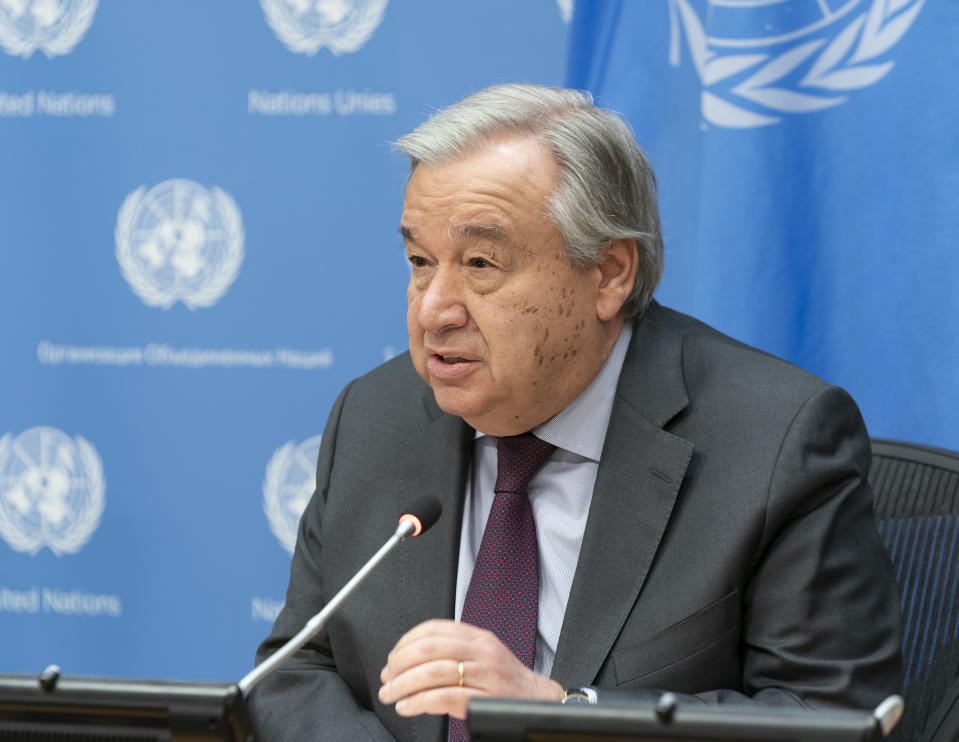3 things that must change so the world can recover from coronavirus

The UN secretary-general has warned that coronavirus is the most challenging crisis the world has faced since the Second World War – and that things must change for it to recover.
Antonio Guterres said the world was confronting a pandemic threatening people in every country, one that will bring a recession "that probably has no parallel in the recent past”.
There is also a risk that the combination of the disease and its economic impact will contribute to "enhanced instability, enhanced unrest, and enhanced conflict", the UN chief said at the launch of a report on the socioeconomic impacts of COVID-19.

Guterres called for a much stronger and more effective global response to the coronavirus pandemic and to the social and economic devastation that it is causing.
He stressed that this will only be possible "if everybody comes together and if we forget political games and understand that it is humankind that is at stake”.
Latest coronavirus news, updates and advice
Live: Follow all the latest updates from the UK and around the world
Fact-checker: The number of COVID-19 cases in your local area
6 charts and maps that explain how COVID-19 is spreading
His warning came as Spain reported a new record of 864 deaths in one day while total infections broke the 100,000 mark, making it the third country to surpass that milestone behind the United States and Italy.
Meanwhile, the US death toll from coronavirus climbed past 3,500 on Tuesday, eclipsing China's official count.
Hard-hit Italy reported that the infection rate appears to be levelling off and new cases could start declining, but that the crisis is far from over.
Worldwide, more than 800,000 people have been infected and more than 40,000 have died, according to a tally kept by Johns Hopkins University.
Guterres described the coronavirus pandemic as a “human crisis” that is “attacking societies at their core” – and set out three things the world needs to do to recover.
A coordinated health response
Guterres said the response to the pandemic – including testing, tracing and quarantine – needs to be “scaled up” in combination with restrictions on movement.
He argued that it was “essential that developed countries immediately assist those less developed to bolster their health systems” to stop the “nightmare” of the disease spreading rapidly and causing millions of deaths.
Guterres added that he was “particularly concerned with the African continent”.
He said many countries are not respecting WHO guidelines, with each tending to go its own way in dealing with the pandemic.

Supporting the vulnerable
Guterres said that while £4 trillion has been mobilised, most of that money was by the developed world to support their own economies from the consequences of the pandemic.
"We are far from having a global package to help the developing world to create the conditions both to suppress the disease and to address the dramatic consequences in their populations, in the people that lost their jobs, the small companies that are operating and risk disappearing, those that live with the informal economy that now have no chance to survive," he said.
"Massive support to the developing world is still required.”
Guterres stressed that there should be a focus on those who he says are the most affected by the crisis – women, older persons, young people, low-wage workers, small and medium enterprises, the informal sector and vulnerable groups.
A different economy
Guterres believes the world “will face a choice” once the crisis is over, and argued that the recovery should lead to a “different economy”.
Calling for countries to be more prepared for future crises, he said: “Everything we do during and after this crisis must be with a strong focus on building more equal, inclusive and sustainable economies and societies that are more resilient in the face of pandemics, climate change, and the many other global challenges we face.”
Guterres added: “What the world needs now is solidarity. With solidarity we can defeat the virus and build a better world.”
Coronavirus: what happened today
Click here to sign up to the latest news, advice and information with our daily Catch-up newsletter




